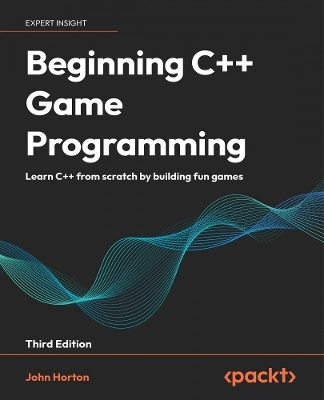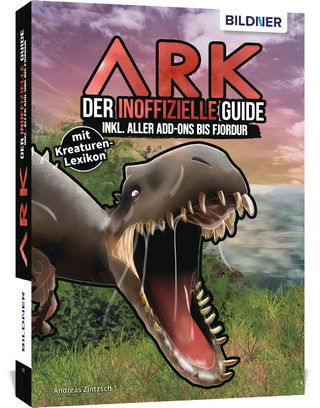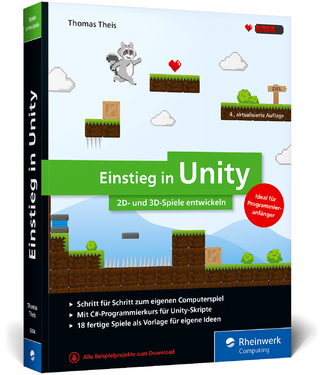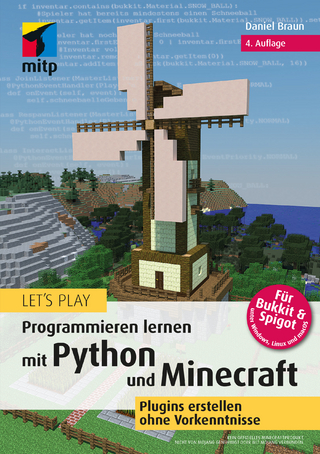
Beginning C++ Game Programming
Packt Publishing Limited (Verlag)
978-1-83508-174-7 (ISBN)
Key Features
Create fun games in C++, with this up-to-date guide covering the latest features of C++20 and VS2022
Build clones of popular games such as a Timberman clone, a Pong game, a Zombie Survival Shooter, and a platform endless runner game
Discover tips to expand your finished games by thinking critically, technically, and creatively
Book DescriptionAlways dreamed of creating your own games? With the third edition of Beginning C++ Game Programming, you can turn that dream into reality! This beginner-friendly guide is updated and improved to include the latest features of VS 2022, SFML, and modern C++20 programming techniques. You'll get a fun introduction to game programming by building four fully playable games of increasing complexity. You'll build clones of popular games such as Timberman, Pong, a Zombie survival shooter, and an endless runner.
The book starts by covering the basics of programming. You'll study key C++ topics, such as object-oriented programming (OOP) and C++ pointers and get acquainted with the Standard Template Library (STL). The book helps you learn about collision detection techniques and game physics by building a Pong game. As you build games, you'll also learn exciting game programming concepts such as vertex arrays, directional sound (spatialization), OpenGL programmable shaders, spawning objects, and much more. You’ll dive deep into game mechanics and implement input handling, levelling up a character, and simple enemy AI. Finally, you'll explore game design patterns to enhance your C++ game programming skills.
By the end of the book, you'll have gained the knowledge you need to build your own games with exciting features from scratch.What you will learn
Set up your game project in VS 2022 and explore C++ libraries such as SFML
Build games in C++ from the ground up, including graphics, physics, and input handling
Implement core game concepts such as game animation, game physics, collision detection, scorekeeping, and game sound
Implement automatically spawning objects and AI to create rich and engaging experiences
Learn advanced game development concepts, such as OpenGL shaders, texture atlases, and parallax backgrounds
Scale and reuse your game code with modern game programming design patterns
Who this book is forThis book is perfect for you if you have no C++ programming knowledge, you need a beginner-level refresher course, or you want to learn how to build games or just use games as an engaging way to learn C++. Whether you aspire to publish a game (perhaps on Steam) or just want to impress friends with your creations, you'll find this book useful
John Horton is a programming and gaming enthusiast based in the UK. He has a passion for writing apps, games, books, and blog articles. He is the founder of Game Code School.
Table of Contents
Welcome to Beginning C++ Game Programming Third Edition!
Variables, Operators & Decisions: Animating Sprites
C++ Strings, SFML Time : Player Input & HUD
Loops, Arrays, Switch, Enumerations & Functions: Implementing Game Mechanics
Collisions, Sound & End Conditions: Making The Game Playable
Object Oriented Programming: Starting the Pong game
Dynamic collision detection and physics: Finishing the Pong Game
SFML Views: Starting the Zombie Shooter Game
C++ References, Sprite sheets & Vertex Arrays
Pointers, Standard Template Library & Texture Management
Collision Detection, Pickups & Bullets
Layering Views & Implementing The HUD
Sound Effects, File I/O & Finishing the Game
Abstraction & Code Management: Making Better Use of OOP
Using Azure with PowerApps Advanced OOP: Inheritance & Polymorphism
Building Playable Levels & Collision Detection
Sound Spatialization & the Player's HUD
Extending SFML classes, Particle Systems & Shaders
| Erscheinungsdatum | 17.05.2024 |
|---|---|
| Verlagsort | Birmingham |
| Sprache | englisch |
| Maße | 191 x 235 mm |
| Themenwelt | Mathematik / Informatik ► Informatik ► Grafik / Design |
| Mathematik / Informatik ► Informatik ► Programmiersprachen / -werkzeuge | |
| Informatik ► Software Entwicklung ► Spieleprogrammierung | |
| ISBN-10 | 1-83508-174-6 / 1835081746 |
| ISBN-13 | 978-1-83508-174-7 / 9781835081747 |
| Zustand | Neuware |
| Haben Sie eine Frage zum Produkt? |
aus dem Bereich


